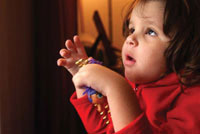UN designates April 2 as World Autism Awareness Day
As the rate of autism increases rapidly, U.N. adopted a resolution that designated April 2 as World Autism Awareness Day.

The resolution surmounted its first hurdle on Nov. 1 when it was approved by the General Assembly's human rights committee. It is co-sponsored by 50 countries and is expected to be adopted by the 192-nation world body in early December.
Qatar's U.N. Ambassador Nassir Al-Nasser told a news conference Tuesday that the country's emir, Sheikh Hamad bin Khalifa Al-Thani, and his consort, Sheikha Mozah Bint Nasser Al Missned, took the initiative because of the high rate of autism in children in all regions of the world.
"Her highness has made tremendous efforts to change the way the Qatari society views people with disability, and breaking the barrier of shame, of which this group and their families have been suffering," Al-Nasser said.
The draft resolution would designate every April 2 as World Autism Awareness Day and ask all countries, U.N. bodies, international organizations and non-governmental groups to take steps to raise awareness of the disorder.
It calls autism "a lifelong developmental disability that manifests itself during the first three years of life and results from a neurological disorder that affects the functioning of the brain." It mainly affects children and is characterized "by impairments in social interaction, problems with verbal and non-verbal communication and restrictive, repetitive behavior, interests and activities," the draft says.
The draft resolution expresses deep concern at "the prevalence and high rate of autism in children in all regions of the world and the consequent developmental challenges."
Autism has always been diagnosed by making judgments about a child's behavior. For decades, the diagnosis was given only to children with severe language and social impairments and unusual, repetitious behaviors. But in the 1990s, the autism umbrella expanded, and now includes a group of milder, related conditions.
Bob and Suzanne Wright, who founded the U.S. national advocacy group Autism Speaks in February 2005 after their grandson was diagnosed with the disorder, stressed the importance of adopting the resolution.
Autism affects "tens of millions worldwide," including 1.5 million Americans, "and numbers are increasing dramatically," Suzanne Wright said.
Bob Wright said Autism Speaks is sponsoring an epidemiological study to measure the scale of the global epidemic, working with more than 20 countries to collect and share data that could help in deciding policies and research into causes, diagnosis and treatment.
The resolution's call for action and observances on April 2 will bring autism organizations from all around the world together "in a single voice to fight this terrible disorder," said Wright, a vice chairman of General Electric, who served as CEO of the NBC television network for more than 20 years.
"By bringing autism awareness to a global level, we'll give it a voice to the millions of children worldwide who are undiagnosed, misunderstood, abused and looking for help," Bob Wright said.
Subscribe to Pravda.Ru Telegram channel, Facebook, RSS!





